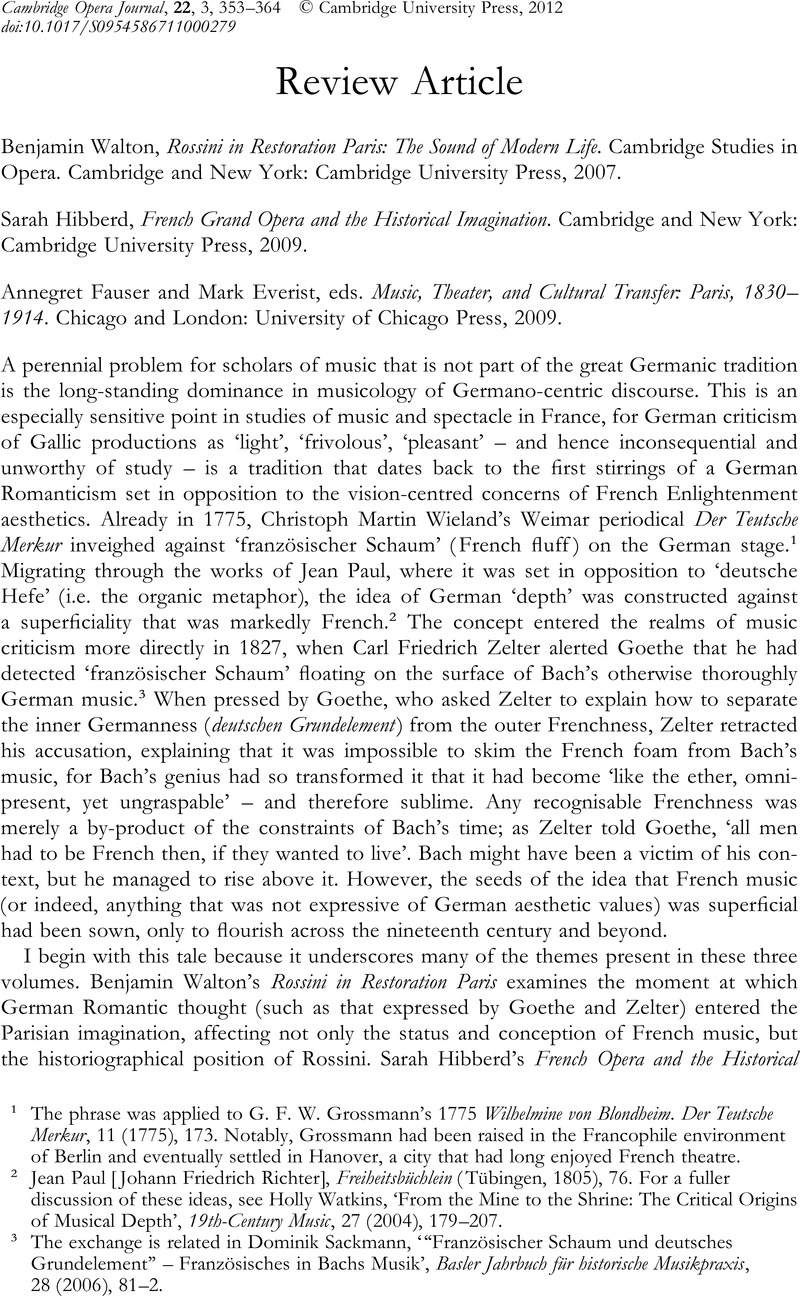No CrossRef data available.
Published online by Cambridge University Press: 25 January 2012

1 The phrase was applied to Grossmann, G. F. W.'s 1775 Wilhelmine von Blondheim. Der Teutsche Merkur, 11 (1775), 173Google Scholar. Notably, Grossmann had been raised in the Francophile environment of Berlin and eventually settled in Hanover, a city that had long enjoyed French theatre.
2 Paul, Jean [Johann Friedrich Richter], Freiheitsbüchlein (Tübingen, 1805), 76Google Scholar. For a fuller discussion of these ideas, see Watkins, Holly, ‘From the Mine to the Shrine: The Critical Origins of Musical Depth’, 19th-Century Music, 27 (2004), 179–207CrossRefGoogle Scholar.
3 The exchange is related in Sackmann, Dominik, ‘“Französischer Schaum und deutsches Grundelement” – Französisches in Bachs Musik’, Basler Jahrbuch für historische Musikpraxis, 28 (2006), 81–2Google Scholar.
4 According to Adorno, ‘music will be the more true and substantial the further it is removed from the official zeitgeist; the one of Beethoven's epoch was represented by Rossini rather than by him.’ Adorno, Theodor, Beethoven: The Philosophy of Music, trans. Jephcott, Edmund (Cambridge, 1998), 46Google Scholar; quoted by Walton on 4. On the ‘twin styles’, see Dahlhaus, Carl, Nineteenth-Century Music, trans. Robinson, J. Bradford (Berkeley and Los Angeles, 1989), 8–15Google Scholar.
5 Walton is clearly aware of what is at stake behind ‘contextualisation’, a concept inherited from the philologically-centred musicological past. One critical difficulty that might be perceived in ‘text vs. context’ (though Walton does not state it as such), is that it is a false binary, and from there it is but a small step to other, more familiar binaries of inner vs. outer, work vs. world, aesthetics vs. society, Self vs. Other. Additionally, if a musical work can be seen as a text that is meaningless until it is contextualized, it follows that the work is indeed autonomous.
6 Gerhard, Anselm, The Urbanization of Opera: Music Theater in Paris in the Nineteenth Century, trans. Whittall, Mary (Chicago, 1998), 15–16Google Scholar; quoted by Hibberd on 3. Hibberd notes that Gerhard's study, first published in German in 1992, has been seen as the most influential book on the genre to appear in the recent decades.
7 On this point, see also Fauser and Everist's introduction to Music, Theater, and Cultural Transfer: ‘the music of the French lyric stage came to be validated on the basis of its historical place, especially when it could be interpreted, rightly or wrongly, as a metaphor for the state’ (3).
8 See her overview of recent scholarship, 6–9.
9 This chapter is an expansion of her essay in Music, Theater, and Cultural Transfer.
10 See, for example, the five musical examples at the centre of Chapter 3, which receive approximately one sentence apiece.
11 Fauser and Everist implicate Carl Dahlhaus in particular; see his Grundlagen der Musikgeschichte (Cologne, 1977), especially 12–33 on ‘aesthetic presentism’Google Scholar.
12 Space constraints will not enable me to discuss all of the essays here.
13 McClary, Susan, Georges Bizet: Carmen (Cambridge, 1992), esp. 52CrossRefGoogle Scholar; Parakilas, James, ‘How Spain Got a Soul’, in The Exotic in Western Music, ed. Bellman, Jonathan (Boston, 1998), esp. 163–6Google Scholar.
14 See, for example, Cook, Nicholas and Everist, Mark's preface to Rethinking Music (Oxford, 1999)Google Scholar: ‘Multivalency – the acknowledgement of the possibly equal validity of multiple interpretations, adumbrated for the first time [in unpublished research] by Harold Powers in 1984 – itself seems almost to have emerged as a passing phase, to be replaced by the next critical position’ (ix).
15 In this, they echo the introduction to another recent collection of opera studies: Fabiano, Andrea, ed., A travers l'opéra. Parcours anthropologiques et transferts dramaturgiques, XVIIIe–XXe siècle. Études en l'honneur de Gilles Van (Paris, 2007)Google Scholar.
16 The project was announced in Espagne, Michel and Werner, Michael, ‘Deutsch-französischer Kulturtransfer im 18. und 19. Jahrhundert: zu einem neuen interdisziplinären Forschungsprogramm des CNRS’, Francia, 13 (1985)Google Scholar. First fruits were published in Espagne, Michel and Werner, Michael, eds., Transferts: Les relations interculturelles dans l'espace franco-allemand (XVIIIe et XIXe siècle) (Paris, 1988)Google Scholar. A competing origins claim for the concept comes from linguistics: Mary Snell-Hornby points to a lecture given by Hans J. Vermeer in 1984, ‘Übersetzen als kultureller Transfer’ (published 1986). See her The Turns of Translation Studies: New Paradigms or Shifting Viewpoints? (Amsterdam and Philadelphia, 2006), 53Google Scholar.
17 Espagne and Werner, eds., Transferts, 5.
18 Espagne and Werner, eds., 12.
19 In German studies of Kulturtransfer, the now-classic text is Lüsebrink, Hans-Jürgen and Reichardt, Rolf, eds., Kulturtransfer im Epochenumbruch: Frankreich-Deutschland 1770 bis 1815, 2 vols. (Leipzig, 1997)Google Scholar. For its use in opera studies, see especially Jacobshagen, Arnold, Opera semiseria: Gattungskonvergenz und Kulturtransfer im Musiktheater, Beihefte zum Archiv für Musikwissenschaft (Stuttgart, 2005), 71ffGoogle Scholar. This book is a revision of the author's Habilitation from 2002. Surprisingly, though Jacobshagen contributed to Fauser and Everist's volume, his work on ‘cultural transfer’ is not mentioned.
20 Fauser and Everist cite Espagne, 's Les transferts culturels franco-allemands (Paris, 1999)Google Scholar as a work that ‘self-consciously reviews much work of the 1990s’ (6n15). A more recent overview of criticism may be found in Béatrice Joyeux, ‘Les transferts culturels. Un discours de la méthode’, Hypothèses (2002). Joyeux, though in the end an apologist for the concept, argues for dropping ‘culturel’ from the equation, and simply discussing ‘transferts’ (158). She also notes the term's resemblance to current configurations of microhistory.